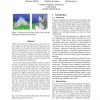Free Online Productivity Tools
i2Speak
i2Symbol
i2OCR
iTex2Img
iWeb2Print
iWeb2Shot
i2Type
iPdf2Split
iPdf2Merge
i2Bopomofo
i2Arabic
i2Style
i2Image
i2PDF
iLatex2Rtf
Sci2ools
107
click to vote
CGI
2004
IEEE
2004
IEEE
Physically-Based Simulation of Objects Represented by Surface Meshes
Objects and scenes in virtual worlds such as 3-d computer games are typically represented by polygonal surface meshes. On the other hand, physically-based simulations of deformations or fracture effects require volumetric representations such as tetrahedral meshes. In this paper we propose techniques to generate volumetric meshes dynamically for objects represented by surface meshes allowing the simulation of physical effects such as motion, deformation and fracture. We use the Finite Element Method based on cubical elements of uniform size. Regular cube meshes have several advantages over geometrically more complex representations. Because of their simplicity, cube meshes can be generated quickly by voxelizing objects while neither geometry nor stiffness information needs to be stored explicitly. The low memory consumption makes physicallybased animation possible for large scenes even on game consoles. We animate the original high resolution surface mesh by coupling it to the underly...
Related Content
| Added | 20 Aug 2010 |
| Updated | 20 Aug 2010 |
| Type | Conference |
| Year | 2004 |
| Where | CGI |
| Authors | Matthias Müller, Matthias Teschner, Markus H. Gross |
Comments (0)

